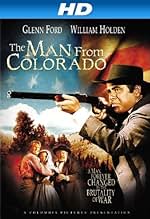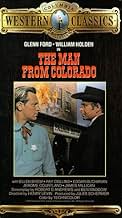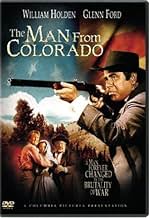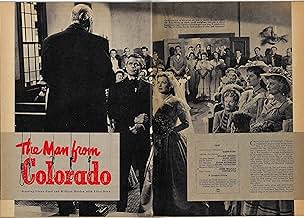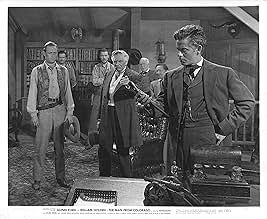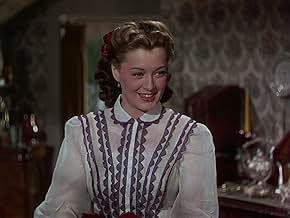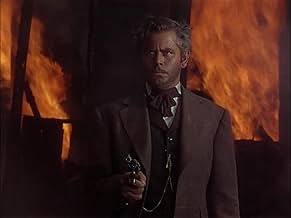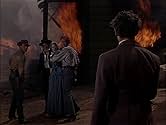IMDb RATING
6.6/10
2.1K
YOUR RATING
At the end of the Civil War, two friends return home to Colorado and one of them has changed and is violent and erratic.At the end of the Civil War, two friends return home to Colorado and one of them has changed and is violent and erratic.At the end of the Civil War, two friends return home to Colorado and one of them has changed and is violent and erratic.
- Director
- Writers
- Stars
- Awards
- 1 nomination total
William 'Bill' Phillips
- York
- (as Wm. 'Bill' Phillips)
Stanley Andrews
- Roger MacDonald
- (uncredited)
Emile Avery
- Townsman
- (uncredited)
Walter Bacon
- Townsman
- (uncredited)
Walter Baldwin
- Tom Barton
- (uncredited)
Symona Boniface
- Matron
- (uncredited)
Chet Brandenburg
- Party Guest
- (uncredited)
James Bush
- Cpl. Dixon
- (uncredited)
Nora Bush
- Townswoman
- (uncredited)
Boyd Cabeen
- Townsman
- (uncredited)
- Director
- Writers
- All cast & crew
- Production, box office & more at IMDbPro
Featured reviews
Colorado was a large, booming territory in 1865. It did not enter the union until eleven years later, and as the only new state to get admission in 1876 it has the right to remain our "Centennial" State (for the centennial of the Declaration of Independence). In the Civil War there were few engagements in Colorado, but one that did stick out was a massacre (there is no other way of putting it) of Indians by a Colonel Chivington at Sands Creek. Chivington's daughter had been raped by an Indian, and he took advantage of a relatively mild act of legal disobedience by the Indians to kill a good number of them.
"The Man From Colorado" is not dealing directly with the Sands Creek Massacre (no Indians are involved in the story). Instead, Chivington's character is transferred to Glenn Ford, who in the closing days of the Civil War perpetrates a similar atrocity, this time on surrendering Confederates. Ford and his friend William Holden have been through the whole war together, but Holden has managed to retain a sense of balance despite the horrors he has seen. Ford is on a slippery slope. Even after the atrocity he is still aware of his act of cruelty and writes in his diary about it. He can't control himself anymore.
Unfortunately his war record stands him well with the richest men in the territory, especially Ray Collins. Collins has managed to get control of the claims that should be used to pay the ex-Union troops. He wants a strong man to be the Federal judge of Colorado territory. Who better than the no-nonsense Ford? So Ford gets the judicial position. Holden has lost his old girlfriend (Ellen Drew) to Ford, but he remains a friend. However he and Drew are increasingly aware of Ford's mental instability. So is everyone (except Ray Collins), as Ford keeps giving the most draconian decisions from the bench. In particular to his former soldiers, now fighting to get back their claims. This, of course leads to their becoming bandits. A vicious cycle, of course. Holden and Drew may be able to break it - Drew has seen Ford's diary.
In the wake of World War II's returning men, and the many suffering psychological trauma, "The Man From Colorado" was a timely film. Ford never played a psychotic type as well as here. Holden (actually in a supporting role - before his burst into super stardom) is a great balance to Ford. Rains performs well as do most of the cast. And by the time the holocaust unleashed by Ford's appointment to the bench is finished, even Ray Collins wishes he never was dumb enough to put this man on the bench.
"The Man From Colorado" is not dealing directly with the Sands Creek Massacre (no Indians are involved in the story). Instead, Chivington's character is transferred to Glenn Ford, who in the closing days of the Civil War perpetrates a similar atrocity, this time on surrendering Confederates. Ford and his friend William Holden have been through the whole war together, but Holden has managed to retain a sense of balance despite the horrors he has seen. Ford is on a slippery slope. Even after the atrocity he is still aware of his act of cruelty and writes in his diary about it. He can't control himself anymore.
Unfortunately his war record stands him well with the richest men in the territory, especially Ray Collins. Collins has managed to get control of the claims that should be used to pay the ex-Union troops. He wants a strong man to be the Federal judge of Colorado territory. Who better than the no-nonsense Ford? So Ford gets the judicial position. Holden has lost his old girlfriend (Ellen Drew) to Ford, but he remains a friend. However he and Drew are increasingly aware of Ford's mental instability. So is everyone (except Ray Collins), as Ford keeps giving the most draconian decisions from the bench. In particular to his former soldiers, now fighting to get back their claims. This, of course leads to their becoming bandits. A vicious cycle, of course. Holden and Drew may be able to break it - Drew has seen Ford's diary.
In the wake of World War II's returning men, and the many suffering psychological trauma, "The Man From Colorado" was a timely film. Ford never played a psychotic type as well as here. Holden (actually in a supporting role - before his burst into super stardom) is a great balance to Ford. Rains performs well as do most of the cast. And by the time the holocaust unleashed by Ford's appointment to the bench is finished, even Ray Collins wishes he never was dumb enough to put this man on the bench.
One of several morose postwar westerns addressing the untidy aftermath of the Civil War, incongruously shot in pristine Technicolor; all the better, presumably, for Columbia to showcase it's fresh young stars. Glen Ford and Bill Holden.
Ford - giving the strangest performance he probably ever gave as the psychotic sheriff - was in reality two years older than Holden; but the grey-templed hairpiece Ford wears (either to make him look older or to show the toll the war has taken on him) actually makes him look even younger.
Ford - giving the strangest performance he probably ever gave as the psychotic sheriff - was in reality two years older than Holden; but the grey-templed hairpiece Ford wears (either to make him look older or to show the toll the war has taken on him) actually makes him look even younger.
Glenn Ford was as good as anyone playing an intense psychotic, which he does here in this above-average western. Ford, playing "Col.Owen Devereaux," gets elected to the position of "judge" right after his distinguished career in the Civil War. Unfortunately, he has mental problems and this position carries too much weight for an unstable sort such as him to be carrying. His best buddy, "Capt. Del Stewart" (William Holden) sees his friend as he is and tries to reason with him and help him out but winds up being alienated, too, by the paranoid judge whose problems escalate as the story goes on.
There's not a tremendous amount of action in here, but it still moves pretty fast and looks really nice on DVD. This is one of the few color films of the 1940s.
Ellen Drew, Ray Collins and Ed Buchnan provide good supporting help in the story. If you like some of the Anthony Mann-James Stewart westerns of the late '40s/early '50s, you should like this one, too.
There's not a tremendous amount of action in here, but it still moves pretty fast and looks really nice on DVD. This is one of the few color films of the 1940s.
Ellen Drew, Ray Collins and Ed Buchnan provide good supporting help in the story. If you like some of the Anthony Mann-James Stewart westerns of the late '40s/early '50s, you should like this one, too.
The end of the Civil War is nigh and one last pocket of Confederate resistance is holed up at Jacob's Gorge. Knowing their time is up they hoist the white flag in surrender. Union Colonel Owen Devereaux sees the white flag but orders the attack anyway. Returning home with his friend and colleague, Capt. Del Stewart, Devereaux grows ever more erratic by the day, his friends, his loves and all who cross him, are sure to pay if they can't rein in his madness.
Starring Glenn Ford as Devereaux and William Holden as Stewart, directed by Henry Levin, The Man from Colorado, from a story by Borden Chase, is an intriguing psychological Western. The story follows the theme of a man ravaged by war and his inability to let go of the anger and mistrust gnawing away at him. Perfectly essayed by Ford as Devereaux (great to see him donning some bad guy boots), the film is rather grim in context. Light on action (no bad thing here at all) it's with the dialogue driven characters that Levin's film really triumphs. Having both become lawmen, it would have been easy for all to just play out a standard oater as the two friends are driven apart by not only their different levels of sanity (Holden's Stewart is an excellent counter point to Ford's blood thirst), but also the love of a good woman (Ellen Drew's petite Caroline Emmet). However, Chase's story has other elements to keep it from ever being formulaic. There's a deep political thread involving power and those entrusted with it, while the treatment of returning soldiers is firmly given prominence. Here the "boys" return after 3 years of being knee deep in blood and bone, to find that their claims are no longer valid. Snaffled by a greedy corporate type, thus as the "boys" look to the law for help?...
As a story it has substance of depth, how nice to also find that there are smart technical aspects to harness the screenplay. The Simi Valley location work is fabulous, most appealing. William E. Snyder's cinematography work is top draw, arguably his best work in the Western genre. It's fair to say that even a "c" grade Western can look nice if given a good transfer, but when the Technicolor print is good, you can tell the difference big time, and this piece is first rate. The dusty orange and browns of the scenery fabulously envelopes the blue uniforms, while the green and gold glow lamps are vivid and shine bright as if extra characters in the piece. Even Ford's greying temples have a classy sheen to them, almost belying his characters anger. All Western fans simply must hone into High Definition TV because although we always knew how fabulous these pictures looked, now it's another dimension of rewards unbound.
As the finale comes in a blaze of fire (welcome to hell!), The Man from Colorado has achieved the two essential Western requirements if it wants to be taken seriously - one is that it looks gorgeous, the other is that it has strong thematics to drive it forward - this has both. Hooray! 8/10
Starring Glenn Ford as Devereaux and William Holden as Stewart, directed by Henry Levin, The Man from Colorado, from a story by Borden Chase, is an intriguing psychological Western. The story follows the theme of a man ravaged by war and his inability to let go of the anger and mistrust gnawing away at him. Perfectly essayed by Ford as Devereaux (great to see him donning some bad guy boots), the film is rather grim in context. Light on action (no bad thing here at all) it's with the dialogue driven characters that Levin's film really triumphs. Having both become lawmen, it would have been easy for all to just play out a standard oater as the two friends are driven apart by not only their different levels of sanity (Holden's Stewart is an excellent counter point to Ford's blood thirst), but also the love of a good woman (Ellen Drew's petite Caroline Emmet). However, Chase's story has other elements to keep it from ever being formulaic. There's a deep political thread involving power and those entrusted with it, while the treatment of returning soldiers is firmly given prominence. Here the "boys" return after 3 years of being knee deep in blood and bone, to find that their claims are no longer valid. Snaffled by a greedy corporate type, thus as the "boys" look to the law for help?...
As a story it has substance of depth, how nice to also find that there are smart technical aspects to harness the screenplay. The Simi Valley location work is fabulous, most appealing. William E. Snyder's cinematography work is top draw, arguably his best work in the Western genre. It's fair to say that even a "c" grade Western can look nice if given a good transfer, but when the Technicolor print is good, you can tell the difference big time, and this piece is first rate. The dusty orange and browns of the scenery fabulously envelopes the blue uniforms, while the green and gold glow lamps are vivid and shine bright as if extra characters in the piece. Even Ford's greying temples have a classy sheen to them, almost belying his characters anger. All Western fans simply must hone into High Definition TV because although we always knew how fabulous these pictures looked, now it's another dimension of rewards unbound.
As the finale comes in a blaze of fire (welcome to hell!), The Man from Colorado has achieved the two essential Western requirements if it wants to be taken seriously - one is that it looks gorgeous, the other is that it has strong thematics to drive it forward - this has both. Hooray! 8/10
It begins at the end of the Civil War when a coward massacre takes place , fdealing with two Civil War vets at odds , as two friends return home to Colorado , one an honest marshall (William Holden) , the other a sadistic judge (Glenn Ford) has changed and is now violent and erratic. As two friends go their separate ways after Civil War , one leads an upright life as a sheriff , but the other corrupted by the war engages in a violent campaign to build his own law , and carrying out terrorisation . Colorado's wasn't big enough for both .. when a moan came between them ! .They Turned the West Into a Jungle of Male Killing Male for a Woman!
An odd , old but solid Technicolor Western fare about two friends return home after their discharge from the army after the Civil War , but one of them becomes an erratic , disturbing judge with quirky acting by Glenn Ford , while his friend decently acted by William Holden who desperately tries to find a way to help him. It begins as a sluggish , slow-moving Western with long ball scenes but follows to surprise us with complex characters , thrills , breathtaking patches and decent plot about two different friends ; as both of them end up on opposite sides of the law . The simple tale is almost rudimentary though full of clichés , as the engaging script lines too often settle for crude routine , at times . Suspense and tension builds over the time in which the outlaws and the starring await to take the final confrontation . The action is competently made , as when the nasties shoot and hang without remission and even fire a village . The highlights of the film are the scenes in which the strict judge exects his particular justice by hanging and the final facing off . William Holden provides a slighly laborious acting as new Marshal , but his interpretation is really eclipsed by the great Glenn Ford has had deep-rooted psychological damage due to his experiences during the war, and as his behavior becomes more and more insane . They're well accompanied by a good support cast , such as : Ray Collins , Edgar Buchanan , Jerome Courtland , James Millican, Stanley Andrews , among others .
The motion picture was well directed by Henry Levin . Ex-actor ,director Henry Levin was a previous stage player who had a prolific and long career as filmmaker entering the directing in 1943 about every genre over the next 36 years . His heyday was in the 1960s , when he turned out several bright and frothy sex comedies, notably ¨Belles on their toes , Come fly with me , Honeymoon hotel¨ , his greatest films were on the adventure genre as ¨Genghis Khan , The wonderful world of Brothers Grimm , The bandit of Sherwood Forest , The return of Monte Cristo and Journey to the center of the earth¨ . Although Levin's forte was light comedies, one of his most interesting films was a dark, brooding western ¨Lonely man¨ (1957) and ¨Desperados¨ , both of them with Jack Palance. He finished his career piloting made-for-television movies, and died on the final day of shooting Scout's Honor (1980) (TV). If you are looking for Westerns with action , violence but also story and atmospheric scenes The Man from Colorado(1948) should be for you.
An odd , old but solid Technicolor Western fare about two friends return home after their discharge from the army after the Civil War , but one of them becomes an erratic , disturbing judge with quirky acting by Glenn Ford , while his friend decently acted by William Holden who desperately tries to find a way to help him. It begins as a sluggish , slow-moving Western with long ball scenes but follows to surprise us with complex characters , thrills , breathtaking patches and decent plot about two different friends ; as both of them end up on opposite sides of the law . The simple tale is almost rudimentary though full of clichés , as the engaging script lines too often settle for crude routine , at times . Suspense and tension builds over the time in which the outlaws and the starring await to take the final confrontation . The action is competently made , as when the nasties shoot and hang without remission and even fire a village . The highlights of the film are the scenes in which the strict judge exects his particular justice by hanging and the final facing off . William Holden provides a slighly laborious acting as new Marshal , but his interpretation is really eclipsed by the great Glenn Ford has had deep-rooted psychological damage due to his experiences during the war, and as his behavior becomes more and more insane . They're well accompanied by a good support cast , such as : Ray Collins , Edgar Buchanan , Jerome Courtland , James Millican, Stanley Andrews , among others .
The motion picture was well directed by Henry Levin . Ex-actor ,director Henry Levin was a previous stage player who had a prolific and long career as filmmaker entering the directing in 1943 about every genre over the next 36 years . His heyday was in the 1960s , when he turned out several bright and frothy sex comedies, notably ¨Belles on their toes , Come fly with me , Honeymoon hotel¨ , his greatest films were on the adventure genre as ¨Genghis Khan , The wonderful world of Brothers Grimm , The bandit of Sherwood Forest , The return of Monte Cristo and Journey to the center of the earth¨ . Although Levin's forte was light comedies, one of his most interesting films was a dark, brooding western ¨Lonely man¨ (1957) and ¨Desperados¨ , both of them with Jack Palance. He finished his career piloting made-for-television movies, and died on the final day of shooting Scout's Honor (1980) (TV). If you are looking for Westerns with action , violence but also story and atmospheric scenes The Man from Colorado(1948) should be for you.
Did you know
- TriviaColumbia Pictures spent quite a bit on The Man in Colorado. At one point, the crew dynamited the side of a 1500-foot mountain in California's San Fernando Valley in order to create a deep gorge as called for by the script. And the western town they constructed was one of the largest location sets ever built by Columbia up to that time. During filming of a massive fire scene at the end, however, the set caught fire uncontrollably, and Holden and Ford tried to actually fight the fire until firemen could arrive. "Dad came away coated in black soot, with burns to his arms and hands," Ford's son Peter later wrote.
- GoofsMany of the men are wearing trousers with belt loops and belts. Belt loops were not added to men's trousers until the 20th century.
- Quotes
Owen Devereaux: [voiceover as he writes in his diary] I killed a hundred men today. I didn't want to. I couldn't help myself. What's wrong with me? I'm afraid... afraid I'm going crazy.
- Crazy creditsOpening credits are listed in the pages of a book being turned by a hand.
- ConnectionsFeatured in La levée des Tomahawks (1952)
- SoundtracksWhen Johnny Comes Marching Home
(uncredited)
Written by Louis Lambert (pseudonym for Patrick Sarsfield Gilmore)
Played at the homecoming
- How long is The Man from Colorado?Powered by Alexa
Details
Box office
- Budget
- $1,000,000 (estimated)
- Runtime
- 1h 40m(100 min)
- Color
- Aspect ratio
- 1.37 : 1
Contribute to this page
Suggest an edit or add missing content


